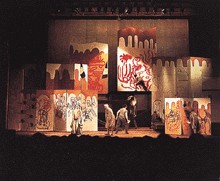1) On the Absurd Theater in the Ming Dynasty


论明代的荒诞戏剧
3) On the Absurd Theater in the Qing Dynasty


论清代荒诞剧
4) The Theatre of the Absurd


荒诞派戏剧
1.
The Theatre of the Absurd,which was born in France in 1950s,toppled over the conception of traditional plays.
20世纪50年代兴起于法国的荒诞派戏剧彻底颠覆了传统的戏剧观念。
2.
Now it is necessary and important for us to make objective analysis and comments on the Theatre of the Absurd.
荒诞派戏剧于20世纪50年代初期在欧洲崛起,于80年代初期开始影响中国,对中国戏剧界产生了冲击波,一些人写了荒诞剧,由于中西方剧作家对荒诞剧理解上的迥异,中西方荒诞剧作品中在主题的表达、人物的塑造、时空的安排、语言的运用等多方面有较大的差异,在"荒诞剧热"已经降温的今天,对荒诞派戏剧的社会意义与艺术价值进行冷静客观的分析是有意义的。
3.
This paper is a brief introduction to the rise and the common characteristics of “the Theatre of the Absurd".
本文对荒诞派戏剧产生的背景以及该派戏剧的共同特征作了简单的介绍。
5) theatre of the absurd


荒诞派戏剧
1.
Aphasia of the Traditional Language——On the language of theatre of the absurd;


传统语言的失语——略论荒诞派戏剧的语言
2.
The absurdity of theatre of the absurd results, in part, from the radical ways of symbolization.
荒诞派戏剧产生荒诞感的重要原因是基于象征手段的极端化。
3.
Beckett abandoned the traditional treatment of dramatic ingredients and in doing so gave birth to a new theatre - Theatre of the Absurd.
贝克特颠覆传统戏剧要素,开创了一种戏剧新形式“荒诞派戏剧”。
6) Theater of the Absurd


荒诞派戏剧
1.
Theater of the Absurd Breadthrough in the Art and the Spirit of Tragedy;


荒诞派戏剧的艺术突破和悲剧精神
2.
Theater of the Absurd, One kind of the plays with the greatest influnce, Wereprosperous on the western stages during 1950s and 1960s.
荒诞派戏剧是20世纪五、六十年代繁荣于西方舞台的最有影响力的戏剧流派之一。
补充资料:荒诞派戏剧
| 荒诞派戏剧 absurd theatre 现代戏剧流派之一 。荒诞 (absurd)一词由拉丁文(sardus)(耳聋)演变而来 ,在哲学上指个人与生存环境脱节。荒诞派戏剧一词最早见于英国戏剧评论家马丁·艾思林1962年出版的《荒诞派戏剧》一书。荒诞派戏剧的哲学基础是存在主义,它拒绝用传统的、理智的手法去反映荒诞的生活,而主张用荒诞的手法直接表现荒诞的存在。其艺术特点为:①反对戏剧传统,摒弃结构、语言、情节上的逻辑性、连贯性。②常用象征、暗喻的方法表达主题。③用轻松的喜剧形式表达严肃的悲剧主题。代表作家有S.贝克特、E.尤内斯库、J.热内等。代表作品有《等待戈多》、《秃头歌女》、《椅子》、《阳台》、《屏风》等。荒诞派戏剧在西方剧坛享有极高声誉,但作为一种强大的戏剧潮流则已成陈迹。
|
说明:补充资料仅用于学习参考,请勿用于其它任何用途。
参考词条
